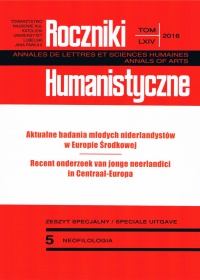Add a prefix to your verb: An (international) cookbook of word formation
Abstract
The word-formation process is like cooking. Like the ingredients of dishes, word-formation affixes blend together. Depending on what we blend with what, we will obtain a new semantic or inflectional unit. This paper is devoted to word-formation from a comparative perspective. On the basis of the selected lexical material, the author examines whether word-formation processes occur in a parallel way in various languages (in this paper we are dealing with one Germanic and one Slavonic language, thus representatives of two different language groups) and whether — on the basis of the compound analysis — it is possible to predict the form of a semantic equivalent in the other language. As this study is a pilot study, it doesn’t contain far-reaching and completely underpinned applications for the semantic equivalence of individual members of compound words in different languages. Nevertheless, the possibility of such equivalences cannot be excluded definitely.
References
Booij, Geert E. & Ariane van Santen. 1998. Morfologie. De woordenstructuur van het Nederlands. Amsterdam: Amsterdam University Press, 1e druk.
Grzegorczykowa, Renata. 1979. Zarys słowotwórstwa polskiego. Słowotwórstwo opisowe. Warszawa: Państwowe Wydawnictwo Naukowe, 3e herziene druk.
Haeseryn, Walter, Kirsten Romijn, Guido Geerts, Jaap de Rooij & Maarten C. van den Toorn. 1997. Algemene Nederlandse Spraakkunst. Groningen: Martinus Nijhoff & Leuven, Wolters Plantyn. 2 vols. 2e geheel herziene druk.
Jadacka, Hanna. 2016. Kultura języka polskiego. Fleksja, słowotwórstwo, składnia. Warszawa: Państwowe Wydawnictwo Naukowe, 1e druk
Copyright (c) 2016 Roczniki Humanistyczne

This work is licensed under a Creative Commons Attribution-NonCommercial-NoDerivatives 4.0 International License.





